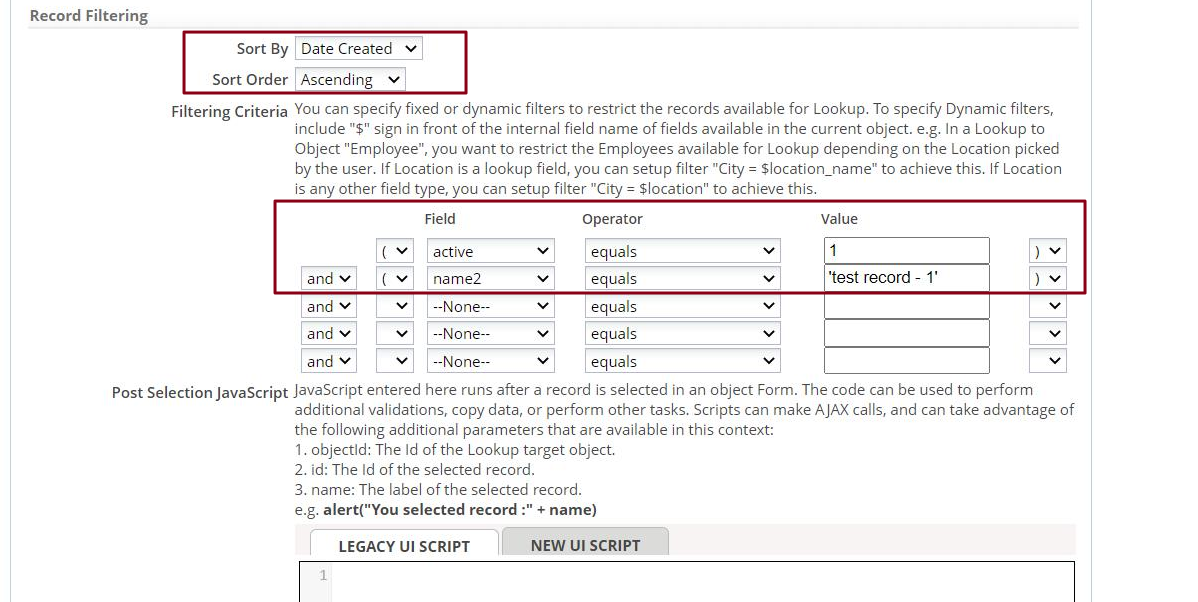Difference between revisions of "Multi Value Lookup"
imported>Aeric |
imported>Aeric |
||
| (16 intermediate revisions by the same user not shown) | |||
| Line 1: | Line 1: | ||
''' | '''[[File:GearIcon.png]] > Customization > Objects > {object} > Forms > Elements''' | ||
A Multi-Value Lookup element | A Multi-Value Lookup element appears in the list of elements for a form whenever the object is in a many-to-many relationship with some other object. | ||
__TOC__ | |||
For example, the Orders object is in a many-to-many relationship with Tags, by virtue of the junction table between them. So a field called '''Tags''' is automatically generated in the element list for the Orders object [[Forms|Form]] (and vice versa). | |||
From the element list, the field can be dragged into a section of the form, at which point the field type will be displayed: '''Multi Value Lookup'''. | |||
===Using a Multi Value Lookup=== | |||
A Multi Value Lookup element is identified by the stacked boxes icon: [[File:MultiValueLookupIcon.png|border]]. For this field, the GUI gives you a checkbox next to each record, so you select as many of the records as you want. | |||
===Sorting and filtering a Multi Value Lookup=== | |||
To control the order in which records appear in the display list: | |||
# Visit the [[Junction Object]] that lies between the ends of the many-to-many relationship. | |||
# In the Junction Object, visit the field that does a Lookup to the object that contains the records you want to sort. | |||
# Under [[Lookup#Record_Filtering|Record Filtering]], make selections for the '''Sort by''' field and the '''Sort Order'''. | |||
# Under [[Lookup#Record_Filtering|Record Filtering]] section, filters can be configured in Filtering Criteria. | |||
{{Note| <br> | |||
# '''Filtering Criteria''' value supports static values only. For example, 123, 1, 2, 3, Created By equals '56ca4a5cdc1d49a9ba044cb28ea7f021'. | |||
# Post selection JavaScript is not supported here. | |||
:[[File:Junc obj record filter3.png]] | |||
}} | |||
''Learn more:'' [[Object Relationships]] | ''Learn more:'' [[Object Relationships]] | ||
Latest revision as of 06:34, 5 August 2021
![]() > Customization > Objects > {object} > Forms > Elements
> Customization > Objects > {object} > Forms > Elements
A Multi-Value Lookup element appears in the list of elements for a form whenever the object is in a many-to-many relationship with some other object.
For example, the Orders object is in a many-to-many relationship with Tags, by virtue of the junction table between them. So a field called Tags is automatically generated in the element list for the Orders object Form (and vice versa).
From the element list, the field can be dragged into a section of the form, at which point the field type will be displayed: Multi Value Lookup.
Using a Multi Value Lookup
A Multi Value Lookup element is identified by the stacked boxes icon: ![]() . For this field, the GUI gives you a checkbox next to each record, so you select as many of the records as you want.
. For this field, the GUI gives you a checkbox next to each record, so you select as many of the records as you want.
Sorting and filtering a Multi Value Lookup
To control the order in which records appear in the display list:
- Visit the Junction Object that lies between the ends of the many-to-many relationship.
- In the Junction Object, visit the field that does a Lookup to the object that contains the records you want to sort.
- Under Record Filtering, make selections for the Sort by field and the Sort Order.
- Under Record Filtering section, filters can be configured in Filtering Criteria.
Learn more: Object Relationships
